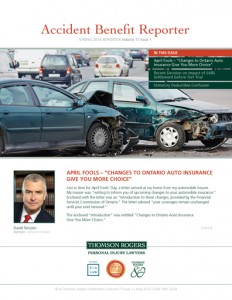APRIL FOOLS – “CHANGES TO ONTARIO AUTO INSURANCE GIVE YOU MORE CHOICE”

Just in time for April Fools’ Day, a letter arrived at my home from my automobile insurer. My insurer was “writing to inform you of upcoming changes to your automobile insurance”. Enclosed with the letter was an “introduction to these changes, provided by the Financial Services Commission of Ontario.” The letter advised “your coverages remain unchanged until your next renewal”.
The enclosed “introduction” was entitled “Changes to Ontario Auto Insurance Give You More Choice”.
This introduction indicated:
- “On June 1, 2016, changes to auto insurance in Ontario will give you more choice and control over your insurance and premiums.
- Statutory accident benefits are changing, and new optional accident benefit choices will be made available to allow you to customize your policy to suit your individual needs.
- The choices will give you greater influence over the price you pay for insurance. The cost of your policy will vary based on the coverage you purchase.”
The introduction further advised “your policy won’t change until it is time for it to be renewed”.
As George W. Bush famously once tried to say “fool me once shame on you, fool me twice shame on me”.
It is bad enough that the Ontario Government has chosen to reduce benefits and restrict access to those reduced benefits. But then the Ontario Government has the audacity to describe (spin) the reductions and restrictions as something that provides more “choice” to potential accident victims. As well, the Ontario Government is simply wrong (dare we say “prevaricating”) when it states that “your policy won’t change until it is time for it to be renewed”.
Ontario Regulation 251/15 with respect to No-Fault Statutory Accident Benefits becomes effective on June 1, 2016. For existing policies (those issued before June 1, 2016) the amounts of coverage (maximum limits) remain the same until the policy renews but then the coverages are drastically reduced unless “optional” coverages are purchased.
Additionally, continuing access to existing coverages are restricted as of June 1, 2016. This is because of sweeping changes to the definition of “catastrophic impairment” that become effective as of June 1, 2016, even on existing policies.
One of the most sweeping changes is with respect to the definition of catastrophic impairment as it applies to brain impairments.
Up to June 1, 2016, a “catastrophic impairment caused by an accident is . . . brain impairment that results in . . . a score of 9 or less on the Glasgow Coma Scale”. This definition was described by the Ontario Court of Appeal as “a bright line rule which is relatively easy to apply”.
As of June 1, 2016, this easy to apply rule will no longer exist. Instead, rules requiring positive diagnostic imaging results and at least Lower Moderate Disability Glasgow Outcome Scale (GOS) findings well after the accident in adults are now to be applied.
For children (under 18 years of age at the time of the accident) hospital admission with positive diagnostic imaging results or rehab hospital admission or at least severe disability findings on the King’s Outcome Scale for Childhood Head Injury (KOSCHI) many months after the accident are now required for a finding of Catastrophic Impairment.
It is anticipated that these more complicated and restrictive catastrophic impairment definitions will deny many seriously injured accident victims access to catastrophic benefits. These same severely injured accident victims would have qualified for those benefits had their accident occurred before June 1, 2016. At the very least, the ability to determine whether a person has sustained a catastrophic impairment will now be delayed in most cases under the new criteria. This will deprive accident victims of sufficient medical and rehabilitation benefits shortly after the accident when those victims most desperately need medical and rehabilitative measures.
When it comes to the “more choice” that the Ontario Government is providing to potential accident victims, it should be noted that this new choice is really only a bad choice. When it comes time to renew an automobile policy following June 1, 2016, the additional choice that has been given to potential accident victims is to drastically reduce the level of benefits available. Alternatively, an insured can pay more for optional benefits that will only provide what coverage was available to all up until June 1, 2016.
The new rules provide that once existing policies renew, the standard non-catastrophic level of medical, rehabilitation and attendant care benefits will reduce from $86,000.00 to $65,000.00 in total. Also, the standard catastrophic level of benefits will reduce from $2,000,000.00 to $1,000,000.00 in total (medical, rehabilitation and attendant care benefits).
The new choice provided to consumers is a bad choice as it means accepting a level of coverage roughly equivalent to what was available in Ontario back in the early 1990s.
Returning to George W. Bush, what he actually managed to say was “fool me once (long pause) shame on (long pause) you (long pause) fool me, you can’t get fooled again.”
With the changes coming to No-Fault Statutory Accident Benefits effective June 1, 2016, we will all be the fools as we will all have to either accept less coverage from our insurers or pay more for optional benefits only to maintain the coverage we all had up to June 1, 2016.
Read article in PDF format: Accident Benefit Reporter Volume 17, Issue 1
Related Resources for Accident Benefits:
https://trlaw.com/news/accident-benefits-changes-june-1-2016/
Share this







